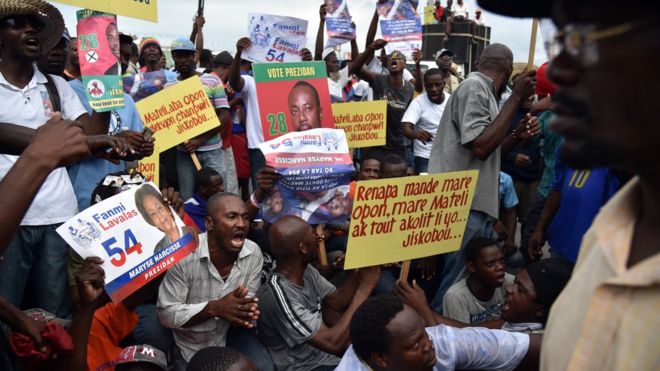War Crimes Prosecution Watch is a bi-weekly e-newsletter that compiles official documents and articles from major news sources detailing and analyzing salient issues pertaining to the investigation and prosecution of war crimes throughout the world. To subscribe, please email warcrimeswatch@pilpg.org and type “subscribe” in the subject line.
Opinions expressed in the articles herein represent the views of their authors and are not necessarily those of the War Crimes Prosecution Watch staff, the Case Western Reserve University School of Law or Public International Law & Policy Group.
Contents
Central African Republic & Uganda
Democratic Republic of the Congo
- Yahoo News: Ivory Coast delays trial for murder of military leader
- Yahoo News: Ousted Burkina leader Compaore charged in Sankara killing
International Criminal Tribunal for Rwanda
- Naij.com: Cameroonian Soldiers Invade Nigerian Villages
- BBC News: Mass Graves for ‘300 Shia Nigerians’ in Zaria
- Al-Jazeera: One Million Forced From School By Boko Haram War
- Council on Foreign Relations: Warning of Kidnapping by Nigeria’s Boko Haram
Court of Bosnia & Herzegovina, War Crimes Chamber
- Court of Bosnia and Herzegovina: Third-instance Verdict Handed Down in the Case v. Veselko Raguž et al.
- Court of Bosnia and Herzegovina: Indictment Confirmed in the Case v. Mehmed Sadiković
- Court of Bosnia and Herzegovina: Trial Verdict Revised in the Case v. Zaim Laličić
- Court of Bosnia and Herzegovina: Prohibiting Measures Ordered Upon Suspect Sakib Mahmuljin
- Court of Bosnia and Herzegovina: Gligor Begović Sentenced to 13 Years in Prison
- Court of Bosnia and Herzegovina: Radoman Fundup Acquitted of Charges
International Criminal Tribunal for the Former Yugoslavia
- Institute For War & Peace Reporting: Current Bosnian Serb Leader Denies Wartime Ethnic Cleansing Policy
- Jurist: ICTY Orders Retrial for 2 Serbs Acquitted of War Crimes
- inSerbia: Simatovic and Stanisic Plead Not Guilty in ICTY Retrial
- inSerbia: ICTY Grants Stanisic and Simatovic Provisional Release
Domestic Prosecutions In The Former Yugoslavia
- The Washington Post: Bosnian Serbs Stop Cooperating With State Over War Crimes
- Ynet News: Kosovo: Former Bosnian Police Commander Arrested in Srebrenica
- Balkan Transitional Justice: Bosnian Croat Fighter Jailed for Wartime Rape
- Balkan Transitional Justice: Serbian Security Chiefs’ Retrial ‘A Chance for Justice’
- Balkan Transitional Justice: Prosecutors ‘Failed to Prove’ Kosovo Serb Leader’s Guilt
- Balkan Transitional Justice: Croatian Policemen’s Grubori Massacre Acquittals Quashed
Extraordinary Chambers in the Courts of Cambodia
- The Cambodia Daily: Meas Muth Faces Charges Including Genocide
- The Cambodia Daily: Nuon Chea’s Lawyer Referred To Bar Over Behavior in Court
- The Washington Times: Assad Not Likely to Face War Crimes Charges as World Leaders Broker Syria Peace Deal
- CNBC: Amnesty Says Russian Strikes on Syria May Amount to War Crimes
Islamic State of Iraq and the Levant
- NBC News: Maryland Man Provided Material Support to ISIS, Officials Say
- Business Insider: National Guard Member Pleads Guilty To Supporting ISIS And Planning An Attack
- Rochester Democrat and Chronicle: Rochester Terrorist Mufid Elfgeeh Guilty Of Recruiting For ISIS
- International Business Times: Isis: UN Security Council Adopts Resolution Aimed At Disrupting Daesh’s Finances
- San Jose Inside: Fremont Man Indicted on Terrorism Charges
- FBI Philadelphia Division: Jalil Ibn Ameer Aziz Indicted for Providing Material Support to ISIL
- AL: ISIS Conspiracy Trial Set For Mississippi State Grad, Homecoming Princess
- MSP News: Alleged ISIS Conspirator Said To Have Bragged About Ability To Take Down MSP Planes
Bangladesh International Crimes Tribunal
- Hindustan Times: Bangladesh Fumes as Pakistan Denies Genocide, War Crimes in 1971
- BDNews24: Bangladesh Committee to Conduct ‘Symbolic Trials’ of 195 Pakistan Army Men
- BDNews24: BNP Chief Khaleda Doubts Number of Bangladesh War Martyrs
- The Maritime Executive: Armament on the High Seas
- The Maritime Executive: Iranian Navy Rescues Tanker From Pirates
- Hellenic Shipping News: Navy’s Ops Force Gulf of Aden Pirates to Shift Base
- UN News Centre: Despite Progressive Laws, Gender-based Violence ‘Pervasive’ in South Africa, UN Expert Warns
- Time: A Yezidi Woman Who Escaped ISIS Slavery Tells Her Story
- NBC News: Boko Haram Violence Forces One Million Children Out of School: U.N.
- The Telegraph: Zambia’s New Ambassador Against Gender Violence Was Convicted of Rape
- UN News Centre: South Sudan: More UN Peacekeepers to be Sent in to Protect Civilians Amid Ceasefire Violations
- The Jurist: UN Security Council Adopts Peace Resolution for Syria
- Arutz Sheva: UN Renews Resolution on Humanitarian Aid to Syria
- Barbara Miltner: The Mediterranean Migration Crisis: A Clash of the Titans’ Obligations?
- A.D. Murray: LSE Law Department Briefings on the Investigatory Powers Bill – Comparing Surveillance Powers: UK, US and France
- Beth Van Schaack: Crimes Against Humanity: Repairing Title 18’s Blind Spots
- Leila N. Sadat & Benjamin Cohen: Impunity Through Immunity: The Kenya Situation and the International Criminal Court


